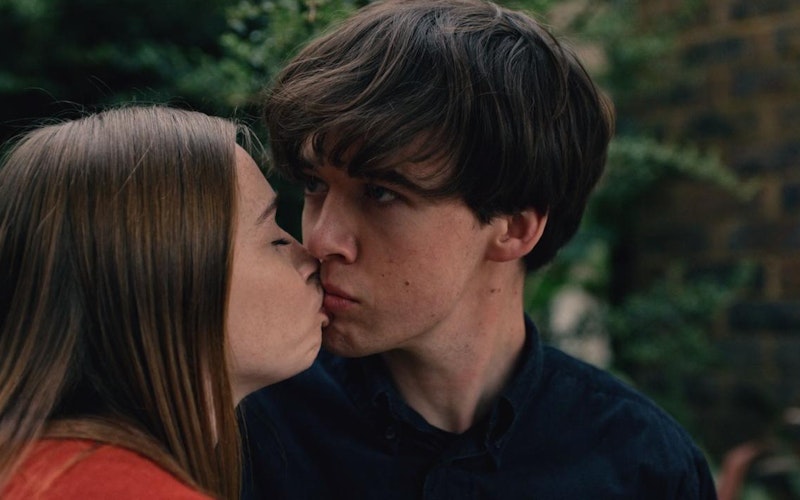
TV
Learning to Love at The End of the F***ing World
Personal transformation is one aspect of Christian faith—the process of becoming more Christlike, more loving. Netflix’s The End of the F***ing World features characters who undergo transformation, which had me wondering how closely that development reflected what one might expect to see in the life of a Christian.
The series’ opening scene nicely portrays the self-absorption that defines James (Alex Lawther), the main character. Sitting on his bed, he stares expressionless in his poorly lit, wood-paneled room. Also the series’ narrator, he tells us, “I’m James … I’m 17 … and I’m pretty sure I’m a psychopath.” We then get a brief tour of James’ favorite hobby: killing small animals. James has become morbid and emotionally shut down after witnessing his mother’s suicide as a boy. And now he finds his high-school lunchroom to be “a good place for observation and selection,” as he fantasizes about killing larger, human animals. Making things a bit more chilling, especially in the wake of the recent school shooting in Parkland, Fla., the soundtrack offers up bubble-gummy love pop as ironic accompaniment. A combination of irony, anger, and despair defines the show's abrasive title.
James soon meets Alyssa (Jessica Barden), another neglected and malcontent teenager, and they decide to run away together (spoilers ahead). Things go bad quickly. James wrecks their stolen car and narrowly escapes a sexual assault in a crummy, gas-station bathroom. They eventually stumble upon an empty house, where bad turns to worse. James discovers home videos revealing that the owner is a rapist and killer; when he returns unexpectedly, James cuts the man’s throat in order to save Alyssa’s life. In the aftermath, James comes to understand that he’s actually not a psychopath—killing the attacker did not produce any of the anticipated gratification, but rather the opposite.
After the murder, Alyssa and James make a clumsy attempt to cover up the incident, which involves them breaking up, getting back together, stealing another car, holding up a gas station, and eventually shacking up with Alyssa’s long-lost biological father in a trailer on a beach in the middle of nowhere.
The changes in James become apparent by episode five, as he and Alyssa reunite in the same roadside diner where they had left each other not long before. They sit side-by-side at the table, daring to be honest with each other, confessing—albeit subtly—genuine emotions. James admits to losing their money; Alyssa apologizes for leaving. Watching these two actors masterfully display conflicting facial expressions, I was unsure whether I should laugh or cry. Meanwhile, the painting of a dirt road leading through deep woods behind them suggested the burgeoning depth of these two—as well as the fact that the road ahead will not be quick or easy. The scene ends with Alyssa clumsily offering her hand for James to hold (which she had denied him earlier). James, nearly smiling now (or was he tearing up?), takes her hand as an oldie fades back onto the soundtrack, more endearing than creepy this time.
One need not follow Christ in order to undergo natural human maturation.
The most noteworthy transformation comes at the end of the show. With the police chasing them down an empty beach, James, in a final desperate act, knocks Alyssa down and tells her to blame the whole thing on him—to say that she was his hostage from the start. Then he keeps running. The police shoot; the screen goes black. James shares a final thought: “I’ve just turned 18 … and I think I understand what people mean to each other.” Though naive and implausible, James’ attempt to take the blame for their entire misadventure would seem to indicate at least the intention of self-sacrificial love. This development marks the end of his path from painful self-absorption to self-offering—to recognizing the value and needs of another.
The character development we see in James is similar to what we’d expect in the life of any Christian. One need not follow Christ in order to undergo natural human maturation, or even to perform good deeds of self-sacrificial love. What’s more, all Christians remain sinners in need of confession and absolution; we can’t fully transform on our own.
But there is a profound difference as well. Christians are also saints—those whose souls have been united with Christ. In The Freedom of a Christian, Martin Luther states that we must put aside our good deeds because “one thing, and one alone, is necessary for life, justification, and Christian liberty; and that is the most holy word of God, the Gospel of Christ…” The good deed of a Christian is to believe in the one God has sent. As Jesus emphasizes, “I am the resurrection and the life. The one who believes in me will live, even though they die.” Unlike mere character development, new and eternal life begins with acknowledging God and hallowing his name by trusting in his righteousness and promises. The End of the F***ing World, despite the dramatic transformation of its main character, represents someone who is only at the beginning of that journey.
Topics: TV